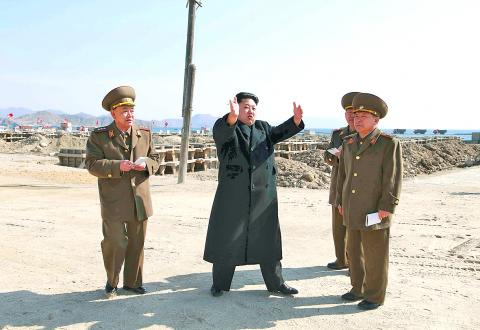North Korean defectors are often baffled by all the English-based words they hear in South Korea, like “shampoo,” “juice” and “self-service” — none of which is used in the reclusive North.
Meanwhile, South Koreans are puzzled by homegrown North Korean words like salgyeolmul, which literally means “skin water” — that’s “skin lotion” south of the border.
The two countries share a language, but the Korean Peninsula’s seven-decade split has created a widening linguistic divide that can result in misunderstandings, hurt feelings and sometimes laughter. The gap has grown so wide that experts say about a third of everyday words used in the two nations are different.

Photo: Reuters
North and South Koreans are generally able to understand each other, given that the majority of words and grammar are still the same. However, the differences show how language can change when one half of the country becomes an international economic powerhouse and the other isolates itself, suspicious of outside influences.
The US’ huge cultural influence through its military presence, business ties and Hollywood has flooded the South Korean vernacular with English loan words and “konglish,” which uses English words in non-standard ways, like “handle” for steering wheel, “hand phone” for cellphone and “manicure” for nail polish.
In North Korea’s view, all that is just further evidence that the South is a US cultural colony.
When Pak Mi-ok first arrived in South Korea after her defection in 2002, she was told by a waitress at a restaurant that water was “self-service,” an English phrase she had not heard before. Too shy to admit she did not understand, she ended up going without water during her meal.
“I worried the waitress would look down on me,” Pak said. She started out working at restaurants, but struggled to understand customers.
“I thought they spoke a different language,” she said.
Pak gradually picked up on the new lingo, and in a recent interview she used words like “stress” and “claim” that are not heard in North Korea.
Pyongyang is so eager to “purify” its language under its guiding philosophy of self-reliance that it vigorously eliminates words with foreign origins and uses homegrown substitutes. Shampoo is called meorimulbinu, or “hair water soap,” and juice is danmul, or “sweet water.”
Linguists say it takes about two years for North Korean defectors to feel comfortable conversing in South Korea.
Given the completely different political and economic systems between the two countries, it also takes a while to learn the connotations and associations that some emotionally-laden words have.
In South Korea, “spec” refers to qualifications and credentials that college students need to land a good job. While defectors can quickly learn what the word literally means, it takes much longer to understand the immense stress associated with the word for young job seekers in South Korea’s ultra-competitive society, Seoul-based Konkuk University research professor Jeon Young-sun said.
Meanwhile, those in the South might struggle to understand the emotional impact of saenghwal chonghwa, the regular meetings in the North, at which people are required to reflect on their behavior and criticize each other. The phrase, which literally means “group discussions on daily lives,” is not used in South Korea.
“We were sick and tired of it,” Pak said. “I still get goose bumps whenever I hear that word.”

Four people jailed in the landmark Hong Kong national security trial of "47 democrats" accused of conspiracy to commit subversion were freed today after more than four years behind bars, the second group to be released in a month. Among those freed was long-time political and LGBTQ activist Jimmy Sham (岑子杰), who also led one of Hong Kong’s largest pro-democracy groups, the Civil Human Rights Front, which disbanded in 2021. "Let me spend some time with my family," Sham said after arriving at his home in the Kowloon district of Jordan. "I don’t know how to plan ahead because, to me, it feels

‘A THREAT’: Guyanese President Irfan Ali called on Venezuela to follow international court rulings over the region, whose border Guyana says was ratified back in 1899 Misael Zapara said he would vote in Venezuela’s first elections yesterday for the territory of Essequibo, despite living more than 100km away from the oil-rich Guyana-administered region. Both countries lay claim to Essequibo, which makes up two-thirds of Guyana’s territory and is home to 125,000 of its 800,000 citizens. Guyana has administered the region for decades. The centuries-old dispute has intensified since ExxonMobil discovered massive offshore oil deposits a decade ago, giving Guyana the largest crude oil reserves per capita in the world. Venezuela would elect a governor, eight National Assembly deputies and regional councilors in a newly created constituency for the 160,000

North Korea has detained another official over last week’s failed launch of a warship, which damaged the naval destroyer, state media reported yesterday. Pyongyang announced “a serious accident” at Wednesday last week’s launch ceremony, which crushed sections of the bottom of the new destroyer. North Korean leader Kim Jong-un called the mishap a “criminal act caused by absolute carelessness.” Ri Hyong-son, vice department director of the Munitions Industry Department of the Party Central Committee, was summoned and detained on Sunday, the Korean Central News Agency (KCNA) reported. He was “greatly responsible for the occurrence of the serious accident,” it said. Ri is the fourth person

Poland is set to hold a presidential runoff election today between two candidates offering starkly different visions for the country’s future. The winner would succeed Polish President Andrzej Duda, a conservative who is finishing his second and final term. The outcome would determine whether Poland embraces a nationalist populist trajectory or pivots more fully toward liberal, pro-European policies. An exit poll by Ipsos would be released when polls close today at 9pm local time, with a margin of error of plus or minus 2 percentage points. Final results are expected tomorrow. Whoever wins can be expected to either help or hinder the